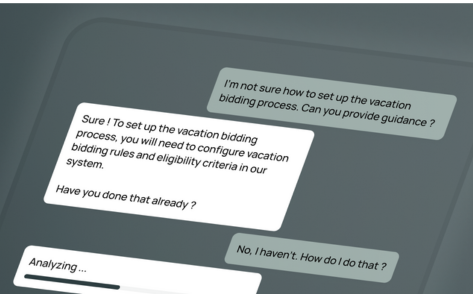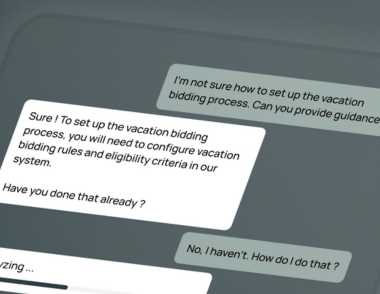What’s Next for HR Tech? The Trends That Will Define 2025
Curious about the future of HR? Explore the key HR tech trends of 2025, from addressing change fatigue to advancing equity and inclusion, and see how these shifts will shape the next era of workforce management.




A new year is the perfect time for resolutions and fresh starts, and it always makes us think: what will be the biggest thing in the months ahead? Everyone's throwing out predictions across different subjects, so we thought we'd share what we believe will shape the future of HR tech in 2025.
We believe these aren't just short-lived trends; they're powerful changes that will shape HR practices for years. From tackling change fatigue to the rise of ethical AI, the trends we've highlighted reflect a shift toward creating solutions that focus on what really matters: the people. These changes won't just align with business goals; they'll help make work environments more engaging, efficient, and inclusive.
Here's what we see shaping the next year and beyond.
1. From Change Fatigue to Change Empowerment
The past few years have seen an exponential surge in HR technologies, leaving employees, and even leaders, grappling with change fatigue. According to recent data, 73% of HR leaders agree that employees are overwhelmed by the volume of changes they face. This overload not only impacts engagement but also undermines the effectiveness of new initiatives.
In 2025, we foresee a shift away from the traditional top-down approach to change management. Instead, organizations will adopt a bottom-up model where middle management is the foundation, acting as key investigators and champions of significant changes. Internal champions and influencers, at both the managerial and employee levels, will play a crucial role in driving change. We've witnessed firsthand how having internal champions has been a game-changer for some of our partners, helping to ensure smoother transitions and greater adoption of new tools.
Investing in technology is costly, so why not ensure everyone benefits from it? Prioritizing change initiatives based on organizational objectives and focusing on those that deliver the most value to employees will be vital. More and more, ROI is being measured not just by the money saved but by how successfully users adopt the tools provided. Let's be honest: happy, engaged employees lead to more productive teams. By empowering employees to embrace change, organizations can transform fatigue into a competitive advantage.
2. Prioritizing People: The Key to Workforce Retention
While talent acquisition remains a critical focus for organizations, retention is just as important, perhaps even more so. After all, once you've hired a qualified and skilled employee, you can't afford to lose them. With 50% of U.S. hourly workers considering a job change and 85.2 million roles globally expected to go unfilled by 2030, the stakes have never been higher.
To address this, companies must prioritize cultivating employee-centric cultures built on trust, transparency, and equity. Retention is no longer just about perks and paychecks; it's about fostering an environment where employees feel valued, heard, and empowered to succeed. As workforce management and scheduling experts, we know flexible and transparent scheduling processes are essential to building this type of culture.
In 2025, we anticipate an increased focus on tools that enhance the employee experience. Self-service and communication platforms, long favored by hybrid and remote teams, will extend to hourly and frontline workers, ensuring they benefit from personalization and flexibility. Organizations that prioritize these innovations will not only retain top talent but also create thriving, engaged teams that drive business success.
3. AI's Role in Shaping 2025
It wouldn't be a conversation about the future without mentioning artificial intelligence (AI). In recent years, AI has been at the center of nearly every industry conversation, and 2025 will be no different. But what does AI's evolution mean for HR?
AI will continue to streamline administrative tasks, enabling HR professionals to focus on strategic priorities. Beyond that, AI-driven tools will provide actionable insights into workforce trends, predict potential challenges, and support ethical decision-making. However, as AI becomes more integrated into HR processes, organizations must address fairness, accountability, and data privacy questions to ensure these tools are used responsibly.
4. Equity and Transparency: Moving Beyond Buzzwords
We've said it before, and we'll keep saying it: union workers want to understand the why and the how. They want transparency to ensure they're getting what they rightfully deserve. With more than a third (35%) of the fastest-growing jobs being blue-collar, and many of these roles represented by unions, the call for equity and transparency in workplace practices, especially in scheduling, has never been louder.
Unionized workers demand clarity and fairness, not just promises. They expect processes to be transparent and grounded in consistently applied rules. Scheduling, in particular, is a focal point, as it directly impacts their day-to-day lives and well-being. Fair shift distribution, clear prioritization, and honoring seniority or preferences aren't just operational concerns. They're foundational to maintaining trust and fostering positive relationships.
In 2025, companies that invest in equitable scheduling tools and processes will not only meet these expectations but will also set the standard for fair labor practices. By ensuring every decision is transparent, and every process is explainable, businesses can strengthen their relationships with union workers, showing that they value their workforce and are committed to doing right by them. Equity and transparency aren't passing trends; they're necessities for a workplace that thrives today and in the future.
Conclusion: Shaping the Future of Work
As we look to 2025, the HR landscape will be defined by a commitment to meaningful change. Addressing change fatigue, creating hyper-personalized employee experiences, embracing AI, and prioritizing equity and inclusion are all trends that promise to transform the workplace for the better.
The challenge for organizations is clear: adopt these trends thoughtfully and intentionally, keeping employees at the center of every decision. By doing so, businesses can create workplaces that are not only more efficient and compliant but also more humane and inspiring for the people who power them.
Subscribe to our Newsletter
Stay ahead of the curve with exclusive updates, valuable insights, and exciting opportunities delivered directly to your inbox
Related articles





